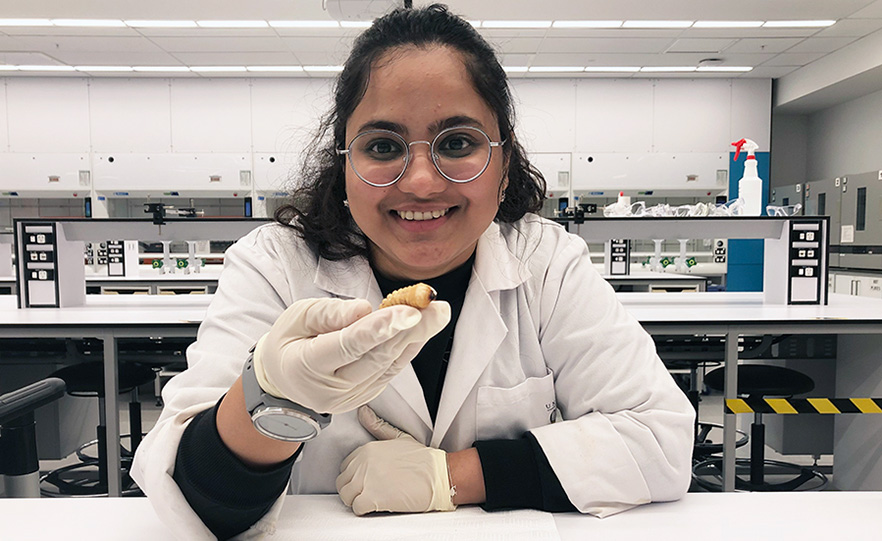
Food Science PhD candidate Ruchita Kavle examines a nutritious grub.
From wild cuisine to a pantry staple – University of Otago research has uncovered future uses of the humble grub.
Researchers in the Department of Food Science have been investigating the nutritional value of huhu grubs and possible food applications of huhu and sago grubs.
They have published two research papers in leading international journals Foods and Journal of Asia-Pacific Entomology, revealing the rich and high-quality proteins of the insects, and their potential uses in a variety of foods.
Co-author and project supervisor Dr Dominic Agyei says the research raises the awareness of the functional properties of edible insect proteins, created by drying and grinding the grubs into powder, and extracting proteins from them.
“Edible insects have a growing reputation as an excellent source of important nutrients such as proteins, fat, and minerals. But we felt the general public was less aware that insect proteins can also have functional properties – the things that make food look and taste good and be appealing,” he says.
The researchers found protein from sago grubs is very good at forming strong gels, foams and emulsions.
Lead author, PhD candidate Ruchita Kavle says the interesting thing is that both grub proteins had the ability to create foams that were stable by at least 80 per cent even after 60 minutes.
“To put this in context, if you had used the insect proteins to make a cappuccino, the foam would still be sitting on top of your coffee after more than an hour.
“These properties make it excellent for use in products like mayonnaise, salad dressings, ice cream, desserts, dips such as hummus, and perhaps in huhu grub milk.
“By including grub protein in these foods, their nutritional value would be boosted,” she says.

Ruchita Kavale and Dr Dominic Agyei.
Dr Agyei believes more people should embrace insects as an alternative protein source.
“Insects are excellent alternatives that diversify our food sources and are incredibly nutritious – they are rich in proteins, minerals, and a compound called chitin, a gut-health-friendly dietary fibre.”
For those who are put off by the sight of insect parts in their food, there are other options.
“Insects can be turned into powders to enhance their appeal and use in other foods. It is remarkable to know that once converted into protein powders, we can harness even more potential uses for these grubs as a sustainable food source,” he says.
Miss Kavle also highlights the sustainability of edible insects – they contribute to eight of the 17 UN Sustainable Development Goals.
“Rearing insects is a low-resource business opportunity which emits fewer greenhouse gases than other animal-based food sources. Insects can also be raised on food waste, which is great for building a circular economy and sustainability,” she says.
Consumer insights is an area in which more research needs to be done to get more people eating insects regularly.
“We need more data to understand the social and psychological factors that control people's motivation to try novel foods. Without consumer buy-in, the many benefits of insects as a source of food cannot be realised. A bigger market would also drive interest from entrepreneurs and researchers, which can drive prices down for the consumer.”
Tasting event
The proof is in the pudding – try insect ice cream yourself!
As part of the New Zealand International Science Festival, you have the opportunity to taste edible insects:
Edible Insects: Treat or Trick? – New Zealand International Science Festival
Saturday 8 July 2023, 2–4pm
Publication details
Nutritional composition and techno-functional properties of sago palm weevil (Rhynchophorus ferrugineus) larvae protein extract
Ruchita Rao Kavle, Ellenna Tamsin Maree Pritchard, Alan Carne, Alaa El-Din Ahmed Bekhit, James David Morton, Dominic Agyei
Journal of Asia-Pacific Entomology
Physicochemical Characteristics, Techno-Functionalities, and Amino Acid Profile of Prionoplus reticularis (Huhu) Larvae and Pupae Protein Extracts
Ruchita Rao Kavle Patrick. J. Nolan, Alan Carne, Alaa El-Din Ahmed Bekhit, James David Morton, Dominic Agyei
Foods
For more information, contact:
Dr Dominic Agyei
Senior Lecturer
Department of Food Science
University of Otago
Tel +64 3 479 7545
Email dominic.agyei@otago.ac.nz
Ellie Rowley
Communications Adviser
University of Otago
Mob +64 21 278 8200
Email ellie.rowley@otago.ac.nz